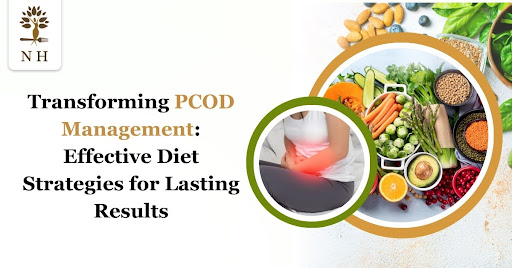
Several millions of women around the world are affected by Polycystic Ovarian Disease (PCOD), much more in India. PCOD affects one’s health in many ways, for example; as a health complication, it affects weight, menstrual cycle and fertility. There is no permanent cure for PCOD, but it can be managed successfully with help of few lifestyle changes depending on dietary plans for PCOD patients. Women with PCOD have the opportunity to improve the quality of their lives, have symptom-free days and get rid of discomfort by making relatively minor changes to their nutrition every day of the year. It is for this reason that, in this article, we are going to look deep into the right diet approaches for PCOD, how they can yield that magical, awesome change in Health and fitness.
PCOD is primarily a hormonal imbalance that affects ovarian function. Women with PCOD may experience irregular periods, excess androgen levels, and small cysts on the ovaries. This imbalance can lead to insulin resistance, weight gain, and inflammation, all of which make managing PCOD symptoms challenging. While medications can offer relief, diet plays a crucial role in addressing these underlying factors holistically.
An effective PCOD diet focuses on reducing inflammation, balancing hormones, and managing insulin levels. This isn’t about strict calorie counting but rather choosing foods that work with your body to regulate hormonal and metabolic functions.
Here’s a comprehensive look at dietary strategies that can make a significant difference in PCOD management:
1. Focus on Low Glycemic Index (GI) Foods
Women with PCOD often struggle with insulin resistance, which can spike blood sugar levels. A PCOD diet that includes low GI foods helps maintain stable blood sugar, reducing insulin spikes. Low GI foods, such as whole grains, legumes, vegetables, and most fruits, release sugar slowly into the bloodstream, preventing abrupt insulin surges.
2. Increase Fiber Intake

Fiber is essential for digestive health and helps control blood sugar levels by slowing down glucose absorption. High-fiber foods are also filling, which can help curb cravings and support weight management, a key component in managing PCOD.
3. Incorporate Lean Proteins
Lean protein is a staple in any effective PCOD diet because it keeps you feeling full longer and supports muscle maintenance without adding unnecessary fats. Adding more protein to your meals can also help regulate hunger hormones, making it easier to maintain a healthy weight.
4. Include Anti-Inflammatory Foods
Inflammation is a common concern for women with PCOD and can worsen symptoms. Foods rich in antioxidants and omega-3 fatty acids have anti-inflammatory properties that support hormone balance and reduce symptoms.
5. Limit Dairy and Sugar Intake
Dairy products and high-sugar foods can exacerbate hormonal imbalances in some women with PCOD. While not everyone with PCOD needs to avoid dairy, it’s worth considering if you experience bloating, acne, or other symptoms after consuming it. Sugar, on the other hand, directly impacts insulin levels, so reducing it can be beneficial for everyone with PCOD.
6. Embrace Healthy Fats
Healthy fats are essential for hormone production and overall metabolic health. Contrary to old beliefs, healthy fats don’t cause weight gain when consumed in moderation; rather, they help the body absorb vitamins and feel satiated.
7. Stay Hydrated
Water is an often-overlooked component of a PCOD diet. Staying hydrated supports digestion, reduces bloating, and helps manage hunger. Drinking enough water is especially important for women with PCOD, as it can also improve skin health, reduce inflammation, and support weight management.

Pairing dietary changes with simple lifestyle habits can maximize results:
To make it easier to get started, here’s a sample day on a PCOD diet:
An effective PCOD diet isn’t just a temporary fix; it’s a lifestyle shift that can provide long-term relief from symptoms. By focusing on low-GI foods, lean proteins, fiber, and anti-inflammatory options, women with PCOD can gain control over their health, improve their energy levels, and reduce uncomfortable symptoms.
At Nirmal Health, we believe in empowering women with the knowledge and tools needed to make positive lifestyle changes. A well-rounded PCOD diet can be transformative, helping to balance hormones naturally and leading to sustained health improvements. Embracing these dietary principles, along with lifestyle modifications, can help women live their healthiest lives despite the challenges of PCOD.